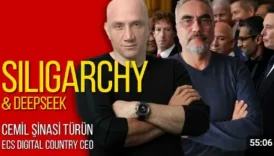THE ROTHSCHILD-ROCKEFELLER CLASH

Special Report Compiled from Journalist Murat Akan’s Insights: There is a hidden struggle on the global stage that seems to have intensified around the time Donald Trump assumed the U.S. presidency. While mainstream discourse often frames conflicts as mere rivalries between nation-states, many analysts argue that the real power players lurk beneath official government structures—particularly among the world’s foremost financial elites. Two families in particular are frequently mentioned in this context: the Rockefellers and the Rothschilds.
- THE ROTHSCHILD-ROCKEFELLER CLASH
- 1. The Invisible War Behind Global Conflicts
- A Quick Historical Look:
- 2. Beyond Nation-States: Multiple Layers of Influence
- 3. Middle East, Israel, and Energy Corridors
- 4. Europe vs. the U.S.: The Grönland Factor and More
- 5. Russia–Ukraine War: A Key Battlefield
- 6. China, Taiwan, and the New Silk Road
- 7. Towards a New World Order?
- 8. Looking Ahead
Both families have long histories of wielding enormous influence in finance, industry, media, and global politics. Although they have occasionally cooperated in the past, recent events suggest a renewed power struggle. Below is a comprehensive look at how this ‘unseen war’ plays out across various fronts, what drives it, and its potential impact on global affairs.
1. The Invisible War Behind Global Conflicts
Modern conflicts rarely manifest as outright conventional wars between states. Instead, the world is witnessing a rise in economic pressure tactics, proxy wars through non-state actors, cyberattacks, and coordinated media campaigns. Widespread ownership of major news outlets, think tanks, philanthropic foundations, and advanced technologies grant certain powerful actors the ability to influence or even override national governments.
Two titans in this domain are the Rockefeller Family, often seen as emblematic of U.S. economic influence, and the Rothschild Family, historically synonymous with global banking networks, particularly with strong roots in Europe and the UK.
A Quick Historical Look:
- The Rockefellers came to prominence primarily through the oil industry in the late 19th century, courtesy of John D. Rockefeller and the Standard Oil empire. From there, they expanded into banking, transportation, real estate, media, and philanthropy. Their influence was so massive that they became synonymous with American big business.
- The Rothschilds emerged in 18th-century Europe by establishing an international network of banks across major capitals including London, Paris, Frankfurt, Naples, and Vienna. They financed monarchies, governments, and massive public projects, becoming arguably the most prominent name in European banking.
Although times have changed, both families still hold considerable sway through global investment portfolios, philanthropic organizations, and strategic alliances across industries.
2. Beyond Nation-States: Multiple Layers of Influence
According to journalist Murat Akan, analyzing world affairs purely through the lens of government-to-government interaction overlooks the intricate connections that powerful financial families have on policy:
“Conventional wars are on the decline, replaced by conflicts fought through tech innovation, media narratives, NGOs, and money flows. Overlooking global financial oligarchies leaves any analysis incomplete.”
In this light, the Rockefellers and Rothschilds heavily influence international affairs—both overtly and covertly. Their networks allow them to shape national policy, public sentiment, and market behavior. This is what some refer to as the “globalist upper hand,” a concept that transcends borders and official decision-making processes.
3. Middle East, Israel, and Energy Corridors
It’s no secret that the Middle East lies at the center of the world’s energy reserves. Tensions in Iraq, Syria, the Gulf, and especially surrounding Israel and Palestine can shift global power balances. Oil and natural gas pipelines, as well as maritime routes, consistently attract international players.
- Rockefeller Family: Having built much of their wealth through oil, they maintain strong connections to both U.S. foreign policy and Middle Eastern monarchies such as Saudi Arabia, the UAE, and others. In U.S. domestic politics, they often align with segments that support Israel, especially given the strong backing of pro-Israel lobby groups and evangelical communities. Their approach is strategic: supporting Israel as long as it aligns with broader American and corporate interests.
- Rothschild Family: Often described as offering Israel near-blanket support, given historical ties to the Zionist movement. Their financial networks across Europe and the UK give them influence over policy decisions regarding Eastern Mediterranean energy projects and European energy security. The EastMed pipeline—which would transport gas from Israel and Cyprus to Europe—illustrates a focal point of Rothschild-Rockefeller interplay.
With enormous natural gas resources lying off Israel’s coast, the question of how (and through which routes) these resources reach European markets often pits U.S.-based interests against London/European financial groups, revealing deeper rifts between these two power blocs.
4. Europe vs. the U.S.: The Grönland Factor and More
During his tenure, Donald Trump floated the controversial idea of buying Greenland from Denmark. While it initially seemed outlandish, closer scrutiny reveals Greenland’s strategic importance due to its oil, gas, rare minerals, and control over Arctic maritime passages.
- Rockefeller Approach: Dominated by the idea of consolidating power under U.S. interests, they champion an energy strategy that bolsters America’s resource security. Securing Greenland (or at least forging closer ties) would give the U.S. a stronger foothold in the Arctic and an advantage over Russia and China in exploiting emerging northern trade routes.
- Rothschild Approach: Historically tied to the British establishment and continental European finance. If the U.S. makes headway in controlling Greenland, Europe could face challenges in resource autonomy and negotiation power. Therefore, preserving European sovereignty and the Atlantic alliance (on Europe’s terms) may be more in line with Rothschild aims.
Trump’s policies on NATO, tariffs on European goods, and other rifts that emerged between the U.S. and EU have also been interpreted as an extension of Rockefeller vs. Rothschild friction. While states still pursue independent interests, the families’ financial and media clout can amplify or dampen political decisions.
5. Russia–Ukraine War: A Key Battlefield
Russia’s invasion of Ukraine marked one of the most disruptive events in recent European history. Western sanctions against Russia and the subsequent energy crisis underscore how closely tied world markets have become—and again highlight differences in approach between these two family influences.
- Rockefeller Family: Known to maintain (directly or indirectly) links with Russian energy operators and to exploit any profitable alignment. While Russia remains a geopolitical rival to the U.S., the enormous oil and gas potential can intersect with American corporate interests.
- Rothschild Family: More invested in ensuring Europe’s energy independence from Russia, aligning with the desire to keep Russia in check. The sabotage of pipelines like Nord Stream complicated Russia’s ability to supply gas to Europe, forcing a search for alternative energy sources—often linked to European-centric finance and trade networks favored by Rothschilds.
Simultaneously, a major conflict in Eastern Europe threatens stability in global energy markets, presenting both risks and opportunities for certain financial groups. This matrix of interests helps explain why the war has such extensive economic and political ramifications.
6. China, Taiwan, and the New Silk Road
Another critical arena is the competition between the U.S. and China, which extends to the issue of Taiwan.
- Rothschild Influence: Positions China as a key growth engine for global finance. The Belt and Road Initiative (“One Belt, One Road”) project is strongly supported by European banks and investment houses, many with historical links to the Rothschild network in London. The idea is a globally integrated trading system.
- Rockefeller Influence: Characterized by an “America First” approach, suspicious of China’s rising economic dominance. Initiatives like increased tariffs and sanctions on Chinese firms reflect the drive to maintain U.S. hegemony.
This China-U.S. standoff extends to technological realms too (e.g., semiconductor exports, 5G infrastructure), further illustrating how deeply these families intersect with global strategic developments.
7. Towards a New World Order?
Regardless of who comes out on top, analysts argue that we may be on the cusp of a new geopolitical reality. A shift from a unipolar to a multipolar world now seems more likely. If the Rockefeller-backed American model prevails, U.S. dominance may remain central, but shaped by Trump-era populism and corporate priorities. If the Rothschild globalist vision ascends, the international system might see a more consolidated network of transnational financial, corporate, and governmental structures.
Turkey is a particularly interesting case in this dynamic. Occupying a pivotal position in the Eastern Mediterranean, the Black Sea region, and the Middle East, it stands at crossroads of energy pipelines, historical trade routes, and cultural influences. Both families arguably see Turkey as a strategic partner (or competitor) in energy corridors that connect the Caspian region and the Middle East to Europe.
8. Looking Ahead
With issues like Greenland, Taiwan, the EastMed pipeline, and more in flux, the rivalry between these two major financial dynasties is likely to become more apparent. States looking to safeguard national interests must navigate the cross-currents of well-financed lobbying, deep-rooted media influence, and control of technological innovation.
As Murat Akan points out, the outcome remains highly uncertain:
“The struggle among families and institutions with power beyond nation-states doesn’t just affect today’s political or economic situation—it shapes where we are heading next. We need to keep an eye on the grand game being played behind the scenes.”
Ultimately, the Rothschild-Rockefeller clash in the modern age transcends a mere anecdotal rivalry. Whether the battleground is in the Arctic, the Middle East, Eastern Europe, or the Pacific, the footprints of these powerful interests can be seen. Even as nations jockey for advantage, the designs of these overlapping—yet often competing—financial blocs significantly influence the global order.
Views: 0
Discover more from
Subscribe to get the latest posts sent to your email.





